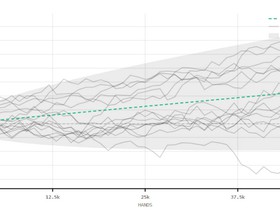There is hardly anyone out there who hasn’t at least heard about Trump’s Big Beautiful Bill, a massive budget reconciliation bill that touches on many areas, including taxes, Medicaid, government spending, and much, much more.
This is one of those extremely long and comprehensive bills that tend to contain many small clauses and amendments that often fly under the radar. One such amendment that could spell serious trouble for professional US online poker players and pro gamblers in general was included in the Senate version of the Bill.
In short, if passed in its current form, the Big (Not So) Beautiful Bill would limit gambling losses to 90% of the losses incurred over the year. For professional gamblers, this 90% would cover their gambling losses and business expenses.
At first glance, the 10% change, while not great, doesn’t seem that bad. However, the way gambling wins and losses are calculated could make it impossible for high-volume players, including US poker professionals, to stay profitable.
When Math Isn’t Mathing
Whenever a topic like this creeps up, it’s always important to emphasize that I (the humble author of this article) am not a US tax professional. The United States has one of the most complicated tax systems in the world, and figuring out all the nuts and bolts takes years, if not decades, of education.
However, from the verbiage of the Bill and everything people with a deeper understanding of this specific topic are saying, things seem quite straightforward and rather bleak for pro gamblers in the country, including professional US poker players.
Professional gamblers have to itemize all of their individual sessions, and most sessions end in a win or a loss. So, for simplicity sake, if you were to play 30 sessions over the year, winning exactly $10,000 at half of them, and losing exactly $8,000 at the other half, your final tally would look like this:
- Gambling profits: 15x$10,000 = $150,000
- Gambling losses: 15x$8,000 = $120,000
The way things work right now, you can deduct your entire gambling losses and only pay taxes on your winnings, which, in this case, would be $30,000.
What the Big Beautiful Bill proposes is that the player is allowed to deduct only 90% of their losses, which, in this case, would be 90%x$120,000 = $108,000.
So, with this specific example, although you won only $30,000 during the year, you’d be paying taxes on $42,000 ($150k – $108k). And, the more sessions you play and the bigger the numbers get, the more financially relevant this becomes, as Phil Galfond explains well in this short video:
Bad News for US Poker Pros
While the changes to the gambling tax may not necessarily impact recreational players (as most gamblers don’t end up with profits), it would have a profound impact on anyone living and/or paying taxes in the US while making a living playing poker.
Profit margins, especially at the higher stakes, are getting slimmer by the day, and even with current taxes, making a consistent and reliable profit is hard.
If the Bill passes in its current form, though, the tax on “phantom” winnings will pretty much wipe out any edge or ROI a professional gambler may have. As Galfond describes in the video above, there would be some instances where you’d be expected to pay more in taxes than your entire yearly income.
High-volume professionals, especially those playing in high-stakes tournaments, easily have years where their wins and losses are in millions, settling at a few hundred thousand profit. However, if your losses column shows $3,000,000 and you are allowed to deduct only $2,700,000, that could easily be your entire yearly profit gone just to cover the tax bill.
Is This Really Happening?
Looking from the outside, one would think that there is no way that the Bill would pass with this specific language. If it doesn’t make sense and has a negative impact on a substantial number of people, lawmakers will realize it and make necessary changes.
The reality is, however, that this wouldn’t be the first time that such a “minor” change is attached to a bill at the last minute, and it goes through without anyone giving it a second thought. After all, as Galfond correctly points out, the UIGEA was passed in a similar fashion.
Rich Muny of the former Poker Players Alliance commented on the latest developments as well, indicating that this was a clear example of why poker players need representation and why abolishing the PPA was a major misstep:
Some politicians claim the deduction is a subsidy for the gambling industry and want it gone completely. Now that it’s on the table, this action could lay the foundation for further reductions in or even elimination of the gambling loss deduction.
PPA would have heard about this before it was added to the Senate bill. Too bad people like Earl Burton wanted PPA gone and are just fine with us having no representation and no victories.
To everyone who wanted PPA gone but who didn’t lift a finger for poker afterward, thanks for nothing.
So, without official representation and someone to stand for their rights, the best poker players can do is reach out to their Congressmen to express their concerns. While it’s hard to gauge how much of an effect this will have, it’s better than doing nothing.
Unless enough people raise their voices to change this last-minute provision, the Big Beautiful Bill could be remembered as, among other things, the Bill That Killed the Poker Dream in America.







